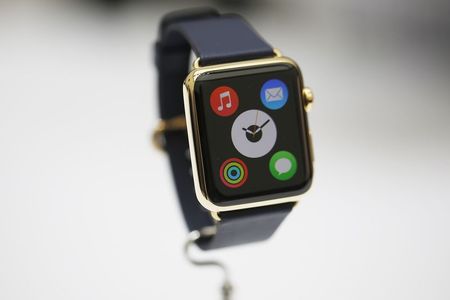By Christina Farr
SAN FRANCISCO (Reuters) - Technology pundits were quick to predict the demise of most fitness wristbands and smartwatches when Apple Inc launched its Apple Watch. But healthcare professionals and fitness junkies were left wanting to see more.
Observers say there is little evidence for now that the device's fitness capabilities surpass the competition. Others, hoping for groundbreaking health features from a company whose Chief Executive Officer Tim Cook spoke of how sensors are "set to explode," were left wondering what's in store for the product.
Two people familiar with Apple's plans told Reuters the company is planning to unveil richer health features and additional sensors in later versions, the first iteration not hitting the market until early 2015.
The sources could not be identified because Apple's plans for the watch are private.
The Apple Watch, unveiled on Thursday, is designed to be used alongside the iPhone. Independently of a mobile device, the watch can track activity: it uses an accelerometer to measure your movement as well as heart rate. Runners can also listen to music through a bluetooth headphone. Many connected wristbands already on the market, such as Jawbone's UP or the Fitbit, can do all that and more.
At this point, it's unclear whether the watch will appeal to the two consumer groups most in need of health data: Self-professed "quantified selfers" who regularly track their own body metrics such as food intake and sleep, and those battling chronic medical conditions and their care providers.
"I'd need to see data that it's useful before buying the watch or recommending it to colleagues," said Joshua Landy, a Toronto, Canada-based critical care specialist and the chief medical officer for Figure 1, a health startup.
Landy said he would look at patients' data from the watch, but would be equally interested in data collected in a notebook.
Danielle Levitas, a technology analyst for IDC, described the health and fitness aspects so far as "table stakes."
"I was expecting there to be some true healthcare applications that would take it a step further beyond wellness," she said. Levitas noted that the watch did not track sleep, like Jawbone's UP wrist band, but said she did not expect this would be a deal breaker for most consumers. Her primary frustration with the watch was the decision to offload GPS and Wi-FI to the phone, presumably to keep the price tag at a modest $349, she said.
Apple declined to comment on future health offerings for its watch.
INTELLIGENT POSITIONING
Apple may have longer-term plans for the watch as it moves into the nascent but highly fertile field of mobile health. Unlike, say, an iPhone, a wrist-worn device can pick up on far more body signals, and in real time.
Policy experts say that Apple may have deliberately avoided mentioning medical use-cases for the watch for now to avoid attracting attention from the U.S. Food and Drug Administration. In its current form, the watch would not pose a threat to makers of mobile medical devices used by patients with chronic conditions.
"Apple probably is very intelligently positioning its products for use to maintain good health generally, which is a perfectly appropriate way to avoid FDA regulation," said Bradley Merill Thompson, a Washington D.C.-based FDA specialist with the law firm Epstein Becker Green.
"There are thousands of unregulated wellness applications on the market, so in a way Apple is joining a crowded field."
Health-focused iOS developers say they are already brainstorming new watch applications. Despite the lack of health advancements, there is hope the watch will appeal to a mainstream market. Mike Lee, chief executive officer of MyFitnessPal, said the sensors in the Apple Watch weren't "revolutionary" but conceded it was better-designed than most wearable devices.
Lee said Apple may have prioritised making the device sleek, slim and wearable, rather than packing it to the brim with sensors in its first iteration.
Nate Gross, a physician and cofounder of Doximity, a mobile and web service that helps physicians communicate, praised Apple for making the most of "cheap and consumer-friendly sensors."
Some doctors said they would be more likely to recommend the watch, once developers build new medical applications.
Mango Health, maker of a mobile application that uses games to solve complex medical problems, is already considering sending medication alerts to patients via the watch.

"We'll see dozens of medical use cases over time," said Mango Health chief executive Jason Oberfest, who works closely with Apple. "This is just the beginning."
(Editing by Edwin Chan and Bernard Orr)
4_800x533_L_1412522645.jpg)